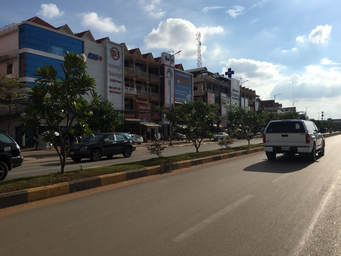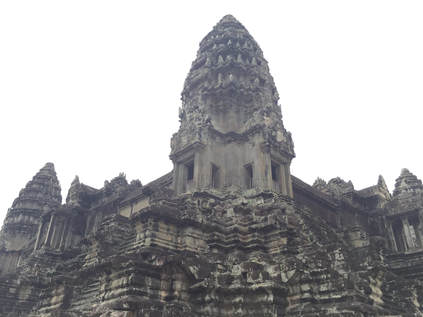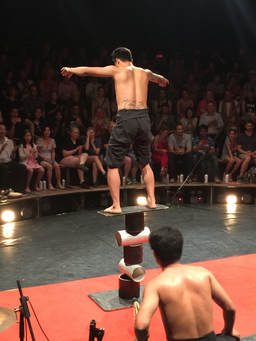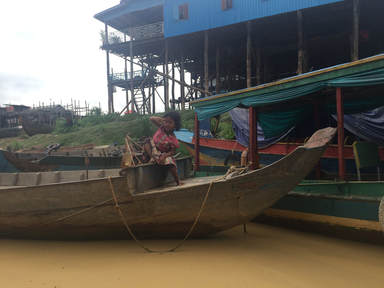 Author: Jody Again we arrived into a city at night which always gives an interesting impression -- always so different day versus night. Disembarking we had to get our visas. We lined up, paid our fee in American dollars and our passports were taken. We waited as we watched our passports being handed down the line of eight officials until we were waved by the last Cambodian official who encouraged all of the foreign visitors to form a large group. We did and watched as each passport was held up, for all to see, waiting to be claimed. As one person commented, "Had I known my photo would be shown to everyone, I would've made sure it was better." while another suggest this was his opportunity for a 'better passport'! Our driver was lovely and surprisingly, took no time in beginning a discussion about Cambodian life and politics. In our 15 minute drive to our hotel, he talked about the Khmer Rouge, poor wages and immigration out of the country. He, himself, had 4 children he had to support and was eager to be hired as our driver over the next few days as we explored the temples. We soon discovered everyone in Cambodia was looking for opportunities to be hired. This type of request was constant from tuk tuk drivers during our time here. As we turned onto the street of our hotel, the road became dirt and bumpy, the lights were non-existent, a Cambodian fruit and vegetable market for locals lined one side while a cement wall the other. The smell of garbage overtook the car. We asked the driver if our hotel was nice and he replied, "So, so." Inset feelings of anxiety here... However, our hotel ended up being very nice. Rich and ornately carved wood furniture and main staircase greeted. While our room was quite basic, the atmosphere and most importantly, the people made our stay in Cambodia special and memorable. The people were lovely and treated us so well, but at times, I'm not sure they knew what to do with us. It seemed the hotel primarily had tours staying there. These tours arrived late and left early the next morning. Really no time for meaningful interactions between the local employees and foreign tourists. Us, on the other hand, we were there for a few days, even spending an entire day at the pool while we planned the African leg of our journey. Through these days and interactions, we came to know the Khmer (Cambodian) people differently than others who are more transient in their stays at the hotel. We greeted them, had discussions, shared our day's experiences. The girls certainly helped too. There is an idleness to Cambodians during their work day so many would stop to watch the girls in the pool (and let's be honest, they stood out while doing handstands). Their kindness blew us away as did the kindness and quiet-spoken manner of Cambodians in general. While we're not naive that this is important within the tourist industry, I'd also like to believe it was also in earnest, too.  Dave and I often commented to each other how unbelievably resilient Cambodians were. As a nation and people they have experienced such incredibly horrific events yet still were bringing kindness to the world and were striving to move forward. As a side note, we decided not to go to the Killing Fields or museum documenting the Khmer Rouge regime. We decided that while we want to open the girls' eyes to the realities of the world, there are limits to what and how we discuss some issues with them. We were guided through Angkor Wat by a man who approached us at the main entrance. An independent guide, we learned far more from him than we were anticipating as he quickly launched into a conversation about time under the Khmer Rouge. He was forthright and open. When we asked him if he should be sharing the information with us as the government might not want these stories told. He simply said, "Everyone knows and it's written in books anyway. Besides what can they do that hasn't already been done?" Dave and I were on our toes to jump in and end the conversation if our guide got too graphic in his descriptions. He told us about the systematic ways the Khmer Rouge implemented the genocide. Fortunately, the girls weren't fully paying attention as they were more interested in passing monkeys than truly listening. We had made them generally aware of this time in Cambodia's history and this level of detail didn't seem to catch their attention. Our guide said that people were taken away from villages with the promise of jobs and re-training (primarily targeting the educated and skilled villagers). They were told they needed to gain new training in order to help train others in the future which would help Cambodia regain its formal glory. They were taken away from their families and villages and communication was cut off. The Khmer Rouge said that once the re-train was complete, in 12 months time, they would be allowed to return to villages and their previous professions. The training never took place. After six months, their family members were invited to a 'reunion' with those taken away for the course. Upon arrival to the 'school' (a long distance from the village), the reunion didn't take place. Our guide shared that Pol Pot said the best way to eradicate a weed was to destroy the stem and the root. Others, having been taken away for actual re-training were told that crimes against their family were being committed by neighbouring villages. They sought revenge with the support of the Khmer Rouge. In these ways Cambodians were turned against Cambodians. Hundreds of thousands of people were massacred. Our guide himself was born in 1979 and his father was killed in 1981. He explained that he had gone to school for 10 years to be a guide - 8 months to learn English and the rest reading, talking to elders in the community and learning the history. Despite all his efforts though, he said his job wasn't a good one. Yet, he continued to hustle for customers every day, all day to provide for his family. We suspect it is his interactions with tourists that put him off. Everyone comes to the developing world expecting to get things for 'cheap'. What they forget is that the people in the service industry have to make a living too and shouldn't expect things for free. We've witnessed this so many times on our travels, it makes us a bit embarrassed. People are so desperate for work, they will work for very, very little which allows them to be taken advantage of by others.  On a happier note, one evening we went to see Phare, The Cambodian Circus - a must if ever you visit Siem Reap! We thoroughly enjoyed this show which told a traditional Cambodian folk tale through music, dance and circus arts. More importantly though is the story behind this organization. It was founded in 1994 by nine young Cambodian men returning home from a refugee camp after the fall of the Khmer Rouge. They had taken art classes and wanted others to benefit from the healing power of the arts. They opened a school and with the support of fees from the circus and from professionals, offer free arts classes to those living in poverty. It was a fabulous evening.  There was also our experience in a floating village. High on stilts houses were built - ready for the rainy season. To us, these homes and the garbage filled environment weren't much to look at, or live in, but upon closer examination there was pride. Ladies swept garbage away from front 'dirt stoops', people helped each other do chores like mending boats and children played together in the river. Bridges were made from 2 X 4s and twine so that after they were inevitably swept away by the river in the oncoming rainy season, they could be rebuilt. Our initial judgements about quality of life quickly turned to conversations about the resourcefulness and resiliency we witnessed in this community. Although the temples were the original focus of our time in Cambodia, quality of life became the focus of our learning. Everything from waste disposal. genocide, gross domestic product, the value of taxes and human resiliency were discussed with the girls. The learning was huge we believe - for all of us.
Oh yeah - and the temples were incredible too.
0 Comments
Your comment will be posted after it is approved.
Leave a Reply. |
AuthorWe're the Danchuks - follow our explorations and family adventures in a wide world (2018). Archives
July 2018
Categories |
 RSS Feed
RSS Feed